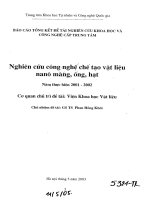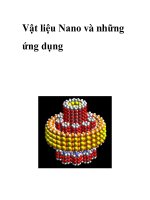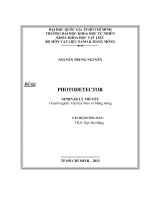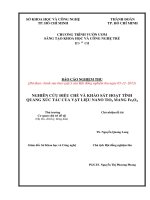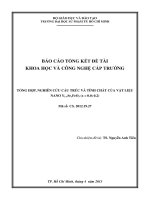Slide vật liệu nano và màng mỏng mertials review part 2
Bạn đang xem bản rút gọn của tài liệu. Xem và tải ngay bản đầy đủ của tài liệu tại đây (2.03 MB, 61 trang )
.c
om
ng
cu
u
du
o
ng
th
an
co
3. Technical Review – Materials
:: EAM 5715 Electronic Devices for Human Interface Systems (EDHIS)
CuuDuongThanCong.com
/>
Stress: N/m2, Pa or psi
σ = P/A0
P: load on the sample
A0: original(zero-stress) cross sectional area
Strain: unitless
ε = (l-l0)/l0 = Δl /l0
l : sample length
l0: original(zero-stress) length
cu
u
du
o
ng
th
an
co
ng
.c
om
Basics – Mechanics of Materials
:: EAM 5715 Electronic Devices for Human Interface Systems (EDHIS)
CuuDuongThanCong.com
2
/>
σ
.c
om
Hooke’s law
σ = Eε
E: Young’s modulus or
elastic coefficient
E
an
co
ng
th
ε
ng
Yield strength
The stress at which a material exceeds its
elastic limits and the material begins to deform
permanently
cu
u
du
o
:: EAM 5715 Electronic Devices for Human Interface Systems (EDHIS)
CuuDuongThanCong.com
3
/>
.c
om
ng
co
cu
u
du
o
ng
th
an
Maximum tensile stress that a
material withstand without rupture
ε
:: EAM 5715 Electronic Devices for Human Interface Systems (EDHIS)
CuuDuongThanCong.com
4
/>
Shear stress and strain
.c
om
τ= F/A
th
an
co
ng
Shear modulus: G
G = shear stress/shear displacement angle
= τ/γ = (F/A)/(ΔX/L)
ΔX Area, A
cu
u
du
o
ng
F
L
:: EAM 5715 Electronic Devices for Human Interface Systems (EDHIS)
CuuDuongThanCong.com
5
/>
F
Poisson’s ratio
Under axial load,
ε(axial) = Δl /l0
ε(transverse) = Δd/d0
Poisson’s ratio;
ν = transverse strain/longitudinal strain
= -ε(transverse) / ε(axial)
Typical values are 0.2 to 0.5
Relation of E and G
E=2G(1+ ν)
cu
u
du
o
ng
th
an
co
ng
.c
om
:: EAM 5715 Electronic Devices for Human Interface Systems (EDHIS)
CuuDuongThanCong.com
6
/>
.c
om
SCS(Single Crystal Silicon)
ng
co
an
th
ng
du
o
u
Anisotropic : crystal
Elastic : catastrophic failure
Young’s modulus = 190GPa < 200(SS)
Hardness = 850 kg/mm2 > 660(SS)
Yield strength = 7x 109 N/m2 > 2.1x109(SS)
Mightier than we think !
cu
:: EAM 5715 Electronic Devices for Human Interface Systems (EDHIS)
CuuDuongThanCong.com
7
/>
.c
om
ng
co
an
th
ng
du
o
u
cu
From Kovacs
:: EAM 5715 Electronic Devices for Human Interface Systems (EDHIS)
CuuDuongThanCong.com
8
/>
Limiting factors
- Crystallographic defects and planes
- Residual stress from high temperature
process and film structure
th
How to overcome?
- Stress consideration from design stage
- Minimize defects during dicing, grinding and
polishing
- Tribological measure: coating and lubrication
- Low temperature process
cu
u
du
o
ng
an
co
ng
.c
om
:: EAM 5715 Electronic Devices for Human Interface Systems (EDHIS)
CuuDuongThanCong.com
9
/>
Because of anisotropy of cubic system,
elastic coefficient is 6x6 matrix in the form of,
C11 C12 C12 0
0 0
Cij =
0 0
C12 C11 C12 0
0 0
C12 C12 C11 0
0 0 0 C44 0 0
0 0 0 0
C44 0
0 0 0 0
0 C44
cu
u
du
o
ng
th
an
co
ng
.c
om
for [100] axis loading
:: EAM 5715 Electronic Devices for Human Interface Systems (EDHIS)
CuuDuongThanCong.com
10
/>
cu
u
du
o
ng
th
an
co
ng
.c
om
Young’s modulus vs crystallographic orientation in SCS
:: EAM 5715 Electronic Devices for Human Interface Systems (EDHIS)
CuuDuongThanCong.com
11
/>
cu
u
du
o
ng
th
an
co
ng
.c
om
(111) planes can be
considered as isotropic
From J. Kim, D. Cho and R. S.
Muller, “Why is a (111) silicon
better mechanical material for
MEMS”, Transducers ’01, 11th Int’l
Conf. Solid State Sensors and
Actuators, Munich, Germany, June
10-14, 2001
:: EAM 5715 Electronic Devices for Human Interface Systems (EDHIS)
CuuDuongThanCong.com
12
/>
Doping effect
Tensile or compressive stress is induced on the
doped area from local contraction or expansion of
lattice, which becomes critical in thin membrane or
beam structure.
p-type Si with Boron
- tensile residual stress
n-type Si with Phosphorus
- compressive residual stress
p++ etch stop: heavily doped Si ( with Boron >7
x1019cm-3) is frequently used for membrane or
beam fabrication
cu
u
du
o
ng
th
an
co
ng
.c
om
:: EAM 5715 Electronic Devices for Human Interface Systems (EDHIS)
CuuDuongThanCong.com
13
/>
Piezoresistivity
.c
om
ng
cu
u
du
o
th
an
co
Change of bulk resistivity by the mechanical stress
applied to the material
Stress Ỉ Strain Ỉ Volume change Ỉ Energy gap
change Ỉ Number of charge carriers change Ỉ
Resistivity change
SCS has a high pzr with excellent mechanical
properties, therefore is widely used for
electromechanical transducers
ng
:: EAM 5715 Electronic Devices for Human Interface Systems (EDHIS)
CuuDuongThanCong.com
14
/>
Principle
.c
om
R0 = ρ0 l/wt
ng
ΔR/ R0 = Δ l/l - Δ w/w - Δ t/t + Δ ρ/ρ0
du
o
ΔR/ R0
ng
th
an
co
Using Poission’s ratio, ν
Δ w/w = Δ t/t = -ν Δ l/l
Gauge factor GF (strain sensitivity) is,
Δ ρ/ρ0
ε
cu
u
GF = --------- = 1 + 2 ν + -----------
Dimensional change
ε
Resistivity change
:: EAM 5715 Electronic Devices for Human Interface Systems (EDHIS)
CuuDuongThanCong.com
15
/>
cu
u
du
o
ng
th
an
co
ng
.c
om
Advantages
GF(SCS) = 80 to 200 compared to GF(metal) = 1
to 5
High sensitivity and good linearity of pzr elements
Robustness of Si
Ease of integration with IC
Resistors can be located where the stress is
maximum (on the surface)
Relatively simple calibration and compensation of
pzr elements
:: EAM 5715 Electronic Devices for Human Interface Systems (EDHIS)
CuuDuongThanCong.com
16
/>
Origin of PZR: Many-valley energy theory
cu
u
du
o
ng
th
an
co
ng
.c
om
Mobility is lowest along <100>
:: EAM 5715 Electronic Devices for Human Interface Systems (EDHIS)
CuuDuongThanCong.com
17
/>
du
o
u
cu
ng
th
an
co
.c
om
Depending on the direction, an electron has
different combination of k1, k2, and k3 in SCS.
Silicon has three pairs of valleys. Valleys are
are identical except for orientation.
Constant energy surface with unequal lengths
(along principal axes) Ỉ different effective
masses and mobilities Ỉ electrons make
anisotropic contribution to conductivity
Uncompressed : all valleys are equally
populated Ỉ isotropic conductivity
Under anisotropic stress: relative energies
change Ỉ electrons transfer from one valley to
another Ỉ populations change, mobilities
change Ỉ anisotropic conduction
ng
:: EAM 5715 Electronic Devices for Human Interface Systems (EDHIS)
CuuDuongThanCong.com
18
/>
Longitudinal and transverse
piezoresitance coefficient
co
ng
.c
om
I
cu
u
du
o
ng
th
an
I
Longitudinal pzr
Transverse pzr
ΔR/R = πl σl + πt σt
:: EAM 5715 Electronic Devices for Human Interface Systems (EDHIS)
CuuDuongThanCong.com
19
/>
Measurement
ng
.c
om
co
V
I
I
ng
th
an
I, V
V
du
o
T
[-110]
cu
u
[010]
[100]
1 dR
T R
= πl1
[110]
πl2
½(πl1+ πl2+ π44)
:: EAM 5715 Electronic Devices for Human Interface Systems (EDHIS)
CuuDuongThanCong.com
20
/>
For SCS (cubic system)
cu
u
du
o
ng
th
an
co
ng
.c
om
:: EAM 5715 Electronic Devices for Human Interface Systems (EDHIS)
CuuDuongThanCong.com
21
/>
cu
u
du
o
ng
th
an
co
ng
.c
om
General expression of pzr for SCS
:: EAM 5715 Electronic Devices for Human Interface Systems (EDHIS)
CuuDuongThanCong.com
22
/>
du
o
ng
th
an
co
ng
.c
om
PZR coefficients for cubic crystal
cu
u
PZR coefficients for SCS at RT (unit: 10-11 Pa-1)
p-Si
n-Si
ρ (Ohm-cm) π11
7.8
6.6
11.7
-102.2
π12
-1.1
53.4
π44
138.1
-13.6
:: EAM 5715 Electronic Devices for Human Interface Systems (EDHIS)
CuuDuongThanCong.com
23
/>
th
ng
<110>, p-Si
an
co
ng
ΔR/R = πl σl + πt σt
.c
om
Resistance changes as a function of stress
u
du
o
ΔR/R = (π44 /2) * (σl - σt )
cu
<110>, n-Si
ΔR/R = (π11 + π12)/2 * (σl + σt )
:: EAM 5715 Electronic Devices for Human Interface Systems (EDHIS)
CuuDuongThanCong.com
24
/>
πl
ng
th
an
co
ng
[-100]
.c
om
Piezoresistance coefficient vs. orientation:
(001) p-Si
cu
u
du
o
[010]
πt
:: EAM 5715 Electronic Devices for Human Interface Systems (EDHIS)
CuuDuongThanCong.com
25
/>

